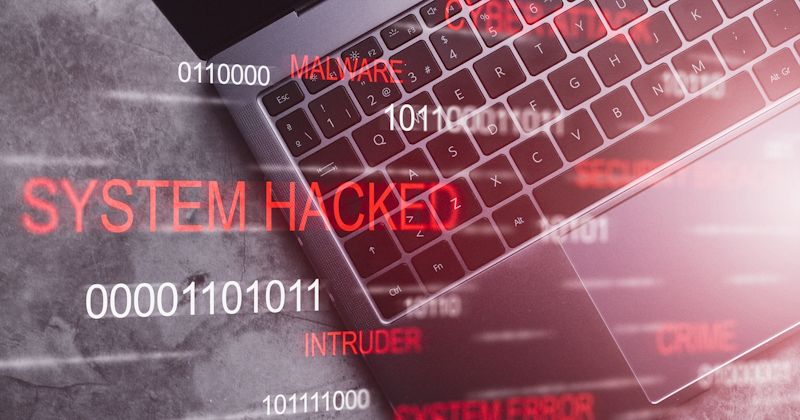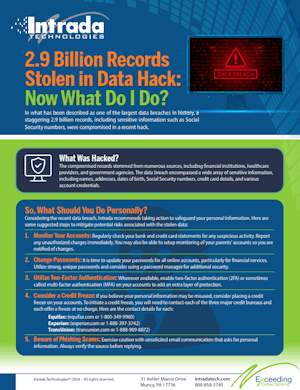Search Engine Optimization, commonly known as SEO, enhances your website to ensure it ranks higher in search engine results. Think of it as tailoring your online content to match what potential customers are searching for. SEO involves technical enhancements and creative elements to increase the qua...
2.9 Billion Records Stolen in Data Hack: Now What Do I Do?
Overview
This article focuses on the critical importance of protecting your personal identification information. In one of history's largest data breaches, approximately 2.9 billion records, including sensitive personal information, were stolen from various sources, including financial institutions and government agencies, raising severe concerns regarding data security. As individuals face potential identity theft and cybercrime, it is crucial to actively monitor accounts, change passwords, enable two-factor authentication, and consider placing credit freezes to safeguard information.
In what has been described as one of the largest data breaches in history, a staggering 2.9 billion records, including sensitive information such as Social Security numbers, were compromised in a recent hack. This breach first came to light when the U.S. Department of Defense (USDoD) announced the infiltration on March 15, 2023, revealing that the stolen data was discovered circulating on various dark web forums. The implications of this data exposure are profound, affecting millions of individuals in the USA, as the information not only includes personal identifiers but also intricate details that could facilitate further identity theft and cybercrime. Researchers have linked the hack to a series of security vulnerabilities that emerged in late 2022, escalating concerns over data protection measures across federal and private sectors.

Although this article may not traditionally align with our usual corporate focus, we believe it’s important to highlight how the recent hack impacts the individuals our clients serve. By shifting our attention to this personal aspect, we aim to emphasize our commitment to understanding and addressing the needs of those at the heart of our clients' services.
As of 2023, the estimated population of the United States is approximately 333 million people. This vast population includes a diverse array of individuals, each with their unique stories and experiences, making the implications of the recent data breach particularly significant. With nearly 2.9 billion records stolen, the potential for many individuals to be affected is alarmingly high, leading to an urgent need for enhanced security measures and public awareness regarding personal data protection.
What was hacked?
The compromised records stemmed from numerous sources, including financial institutions, healthcare providers, and government agencies. The data breach encompassed a wide array of sensitive information, including names, addresses, dates of birth, Social Security numbers, credit card details, and various account credentials. Many of these records originated from legitimate databases that were used for identity verification and customer management, facilitating a seamless experience for users. Unfortunately, the company's lax security protocols and failure to adequately encrypt sensitive information led to unauthorized access.
A Sad Reality: Data Breaches Are Becoming Commonplace
A disheartening reality highlighted by many mainstream media outlets is that individuals should not be overly alarmed, as the information affected in this recent hack has frequently been compromised in the past. For instance, the 2017 Equifax breach, where the personal data of approximately 147 million people was exposed, illustrates the severe risks inherent in data security. This incident, like the current breach, underscored the vulnerabilities present in both corporate and governmental systems, leading many experts to assert that our personal information is often shared across various platforms, making it increasingly susceptible to unauthorized access. This ongoing challenge emphasizes the importance of continued vigilance and proactive measures to protect personal data.
So, What Should You Do Personally?
In light of the recent data breach, it’s crucial for individuals to take action to safeguard their personal information. Here are some recommended steps to mitigate potential risks associated with the stolen data:
- Monitor Your Accounts: Regularly check your bank and credit card statements for any suspicious activity. Report any unauthorized charges immediately. You can also be setup to monitor your parents accounts so your notified of changes related to activity on the account.
- Change Passwords: It is time to update your passwords for all online accounts, particularly for financial services. Utilize strong, unique passwords and consider using a password manager for additional security.
- Utilize Two-Factor Authentication: Whenever available, enable two-factor authentication (2FA) or sometimes called
Multi-Factor Authentication MFA MFA - Consider a Credit Freeze: If you believe your personal information may be misused, consider placing a credit freeze on your accounts. To initiate a credit freeze, you will need to contact each of the three major credit bureaus and each offer a freeze at no charge. Here are the contact details for each:
- Equifax: Visit their website at equifax.com or call 1-800-349-9960.
- Experian: You can freeze your credit by going to experian.com or calling 1-888-397-3742.
- TransUnion: To request a freeze, visit transunion.com or call 1-888-909-8872.
Intrada recommends keeping track of the login information so you can easily access and unfreeze if you need to apply for anything financial.
- Beware of Phishing Scams: Exercise caution with unsolicited communications that ask for personal information. Always verify the source before replying. While this deserves further discussion, the key takeaway is to NEVER respond to or click on links in unexpected emails. Remember, nothing critical should be communicated solely through email.
Stay Vigilant Against Scams
In light of the fact that most of the records stolen contained Social Security numbers, it is crucial to remain acutely aware that scammers will likely attempt to exploit this data by tricking individuals through email and phone calls into providing additional information needed to access their accounts. Under no circumstances should you provide personal details or click on links in emails that prompt you to sign in to your Social Security account or other financial and insurance accounts. If you receive a call or an email that seems suspicious, make sure to verify its legitimacy by calling the organization directly or by opening a new browser window and typing in the correct website address yourself. This simple precaution can help protect you from falling victim to scams targeting vulnerable individuals in the wake of the data breach.
Intrada encourages all our clients and staff to be aware of these threats and would recommend that if you service individuals in the personal care, medical, or elderly, consider educating your clients, residents or their guardians on these protective measures. By providing them with valuable information on how to safeguard their personal data, we can help protect the people we serve and support from these hackers.
Accountability in the Wake of Data Breaches
On a positive note, accountability is being pursued as a growing number of affected individuals and advocacy groups are stepping forward to initiate legal action against the company responsible for the data breach. These lawsuits contend that the firm failed to prioritize security protocols, which led not only to the massive data loss but also to the distress and potential harm caused to millions of individuals. Plaintiffs are asserting that the company’s negligence in safeguarding sensitive information and its inability to promptly acknowledge the breach violates consumer trust and legal standards for data protection. Such actions highlight a shift towards holding companies accountable for their cybersecurity practices, potentially paving the way for stricter regulations and increased vigilance in protecting personal data. This movement advocates for a future where data security is taken seriously, and companies are compelled to invest in robust protective measures.
In Closing
If you provide services to the elderly and are looking for assistance in creating a simple training session or crafting informative postings for your organization, Intrada would be glad to help. Our team is committed to help educate your clients, residents, or their guardians about data protection measures. Ensuring that those you serve are informed and prepared can significantly reduce their vulnerability to hacking and data breaches. Reach out to us for support in developing materials tailored to foster a safer environment for everyone involved.

Cybersecurity Awareness Poster
Open the Door to New Possibilities in Content...
In the rapidly evolving world of digital content, headless CMS (Content Management System) has emerged as a revolutionary solution for developers and content creators alike. Unlike traditional CMS platforms that couple the backend (where content is created and managed) with the frontend (the present...



